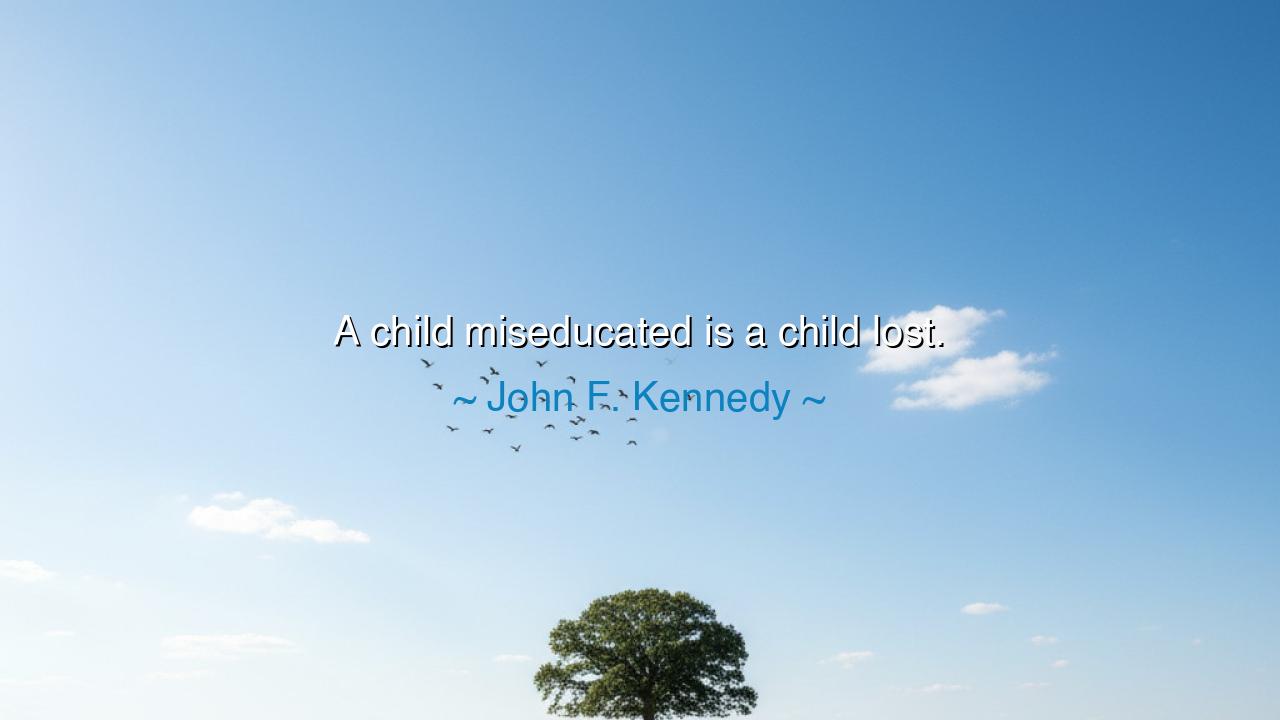
A child miseducated is a child lost.






John F. Kennedy, a leader who stood at the edge of a new era, once spoke words that resound like a trumpet call through the ages: “A child miseducated is a child lost.” This phrase is no idle remark, but a solemn warning, for within it lies the destiny of nations and the fate of generations. To educate a child is to shape the future; to misguide them is to cast them into darkness, where their gifts wither and their potential is never realized. And what is true of one child is true of many: a nation that miseducates its youth is a nation that stumbles toward decline.
Kennedy’s words arise from the deep truth that children are the clay of tomorrow, soft yet full of possibility. If they are molded with wisdom, justice, and love, they grow into pillars of strength; if they are shaped by lies, neglect, or hatred, they may collapse under the weight of life. Miseducation is not merely ignorance—it is the planting of poison where fruit might have grown. It creates not only lost individuals, but broken societies. For the future belongs to those who guide their children rightly, and no treasure is greater than this sacred trust.
The ancients themselves proclaimed this truth. Plato declared that the beginning of education determines the soul’s later course, and Confucius taught that the cultivation of the young shapes the harmony of the state. History confirms it: when Sparta trained its youth for nothing but war, it produced warriors but lost philosophers, poets, and dreamers; its power was short-lived. Athens, by contrast, educated for wisdom and civic duty, and though it fell in battle, its legacy of thought endures for millennia. Thus, miseducation is not only a personal loss—it is a loss to all humanity.
Consider the tragedy of the Cultural Revolution in China. For a generation, children were torn from traditional learning, deprived of history, and fed with dogma and suspicion. Millions were miseducated to distrust their elders, to despise wisdom, to follow blindly. That era left scars still visible today, for a people cannot so easily heal from the deliberate loss of its children’s minds. Compare this with nations that invested in education rooted in truth and innovation, such as Finland, which rose from poverty into prosperity by nurturing its children’s minds rather than misdirecting them.
The meaning of Kennedy’s words, then, is both a warning and a charge. If a child is lost through miseducation, it is not the child’s fault, but the fault of those entrusted with their guidance—parents, teachers, leaders, and communities. To fail them is to fail ourselves, for they are not merely heirs of our traditions but the builders of what we ourselves shall one day inhabit. The miseducated child becomes the misguided citizen, the corrupt leader, the broken link in the chain of civilization.
The lesson is clear: guard the education of children with all diligence. Ensure that what they are taught is not only fact, but wisdom; not only skill, but virtue. Do not feed them prejudice disguised as truth, nor empty rhetoric disguised as knowledge. Teach them to question, to think, to love justice, to seek peace. For in doing so, you preserve not only their future, but the very soul of the world.
Practical actions follow easily. Parents must nurture curiosity at home, not merely obedience. Teachers must see their role as sacred, forming not just minds but character. Leaders must invest in schools and protect them from corruption, neglect, or exploitation. And each of us must remember that to speak truth, to encourage, to mentor even one child, is to light a torch that may guide generations.
So let this wisdom be handed down: a child miseducated is a child lost, but a child rightly educated is a nation’s greatest victory. Therefore, guard their learning as you would guard your treasures, for in their minds lies the strength of tomorrow. Nurture them with truth, water them with love, and guide them with courage. Then the children shall not be lost, but found—rising as the builders of a brighter, nobler world.






AAdministratorAdministrator
Welcome, honored guests. Please leave a comment, we will respond soon